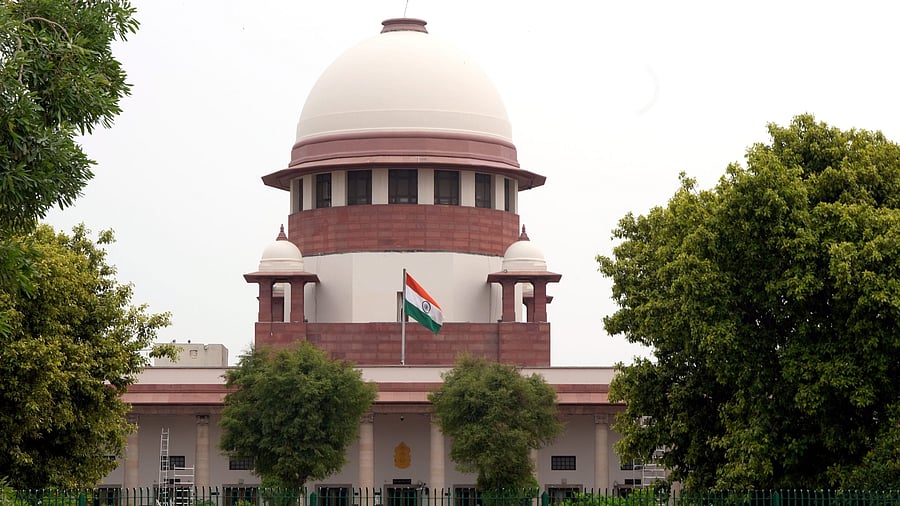
A view of the Supreme Court (SC) of India.
Credit: PTI Photo
New Delhi: The Supreme Court on Tuesday held that no constitutional court can direct the trial courts to write orders on bail applications in a particular manner as it may tantamount to interference with the discretion.
"The constitutional courts can lay down the principles governing the grant of bail or anticipatory bail. However, the constitutional courts cannot interfere with the discretion of our trial courts by laying down the form in which an order should be passed while deciding bail applications," a bench of Justices Abhay S Oka and Augustine George Masih said.
The apex court expunged all adverse remarks and observations made by the Rajasthan High Court against appellant Ayub Khan, District and Sessions Judge for his failure to go comply with a 2020 HC's judgment to mention in tabular form antecedents of an accused while deciding the bail applications. It also set aside the HC's findings that the appellant has indulged in disobedience of judicial instructions and indiscipline.
The court also held that the adverse remarks and observations made against the appellant in the orders cannot be the basis for taking any action against the appellant on the administrative order.
After hearing senior advocate Sidharth Luthra on behalf of aggrieved judge, the bench said, "We fail to understand how the appellant committed acts of indiscipline or contempt by not following the suggestion incorporated in the (2020) judgment."
Secondly, even assuming that the appellant was guilty of indiscipline, on the judicial side, the bench felt, "The High Court ought not to have passed an order calling for an explanation from a judicial officer. The direction of calling for an explanation from a judicial officer by a judicial order was inappropriate. Explanation of a judicial officer can be called for only on the administrative side."
The counsel submitted that the High Court cannot interfere with the judicial discretion of the Session Judges by instructing them to pass orders by incorporating information about the antecedents of the accused in a particular format.
Agreeing to the contention, the bench also relied upon 'Sonu Agnihotri Vs Chandra Shekhar and Others' (2024), to observe, "The High Court ought to have shown restraint. The High Court cannot damage the career of a judicial officer by passing such orders. The reason is that he cannot defend himself when such orders are passed on the judicial side."
With regard to HC's order on mandatory mentioning of antecedents of the accused in tabular form, the bench pointed out, the principles to be followed while deciding on a bail application are well settled.
"If trial courts commit errors while deciding bail applications, the same can always be corrected on the judicial side by the courts, which are higher in the judicial hierarchy," the bench said.
The court also emphasised the presence of the antecedents of the accused is only one of the several considerations for deciding the prayer for bail made by him.
The bench also said when the prosecution places on record material showing antecedents of the accused, and if the court concludes that looking at the facts of the case and the nature of antecedents, the accused should be denied bail on the ground of antecedents, it is not necessary for the court to incorporate all the details of the antecedents as required by the decision in the case of Jugal Kishore Vs State of Rajasthan (2020).
"However, if a High Court directs that in every bail order, a chart should be incorporated in a particular format, it will amount to interference with the discretion conferred on the trial courts. Therefore, in our view, what is observed in the decision in the case of Jugal Kishore cannot be construed as mandatory directions to our Criminal Courts," the bench stressed.
At the highest, it can be taken as a suggestion which need not be implemented in every case, the bench said.
"No constitutional court can direct the trial courts to write orders on bail applications in a particular manner. One Judge of a Constitutional Court may be of the view that trial courts should use a particular format. The other judge may be of the view that another format is better," the bench said.
The appellant contended the High Court went to the extent of observing that the act of disregarding direction contained in the decision in the case of Jugal Kishore is not only indiscipline but is a serious matter which may amount to contempt and an explanation of the appellant was called for.
The bench found the appellant was forced to give a reply and was left with no choice but to tender an apology by submitting the reply.
"With the utmost respect to the High Court, undertaking such an exercise was a waste of precious judicial time of the High Court which has a huge pendency," the bench said.
